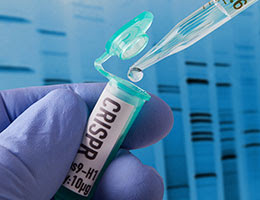 |
|
Wei Li, Ph.D., a principal investigator in the Center for Genetic Medicine Research, received $2.23 million from the NIH to develop statistical and computational methods that sidestep existing hurdles that currently complicate genome-wide CRISPR/Cas9 screening. |
|
 |
|
To help improve outcomes to allogenic hematopoietic stem cell transplants for patients with Epstein Barr virus (EBV)-associated lymphomas, researchers are testing transplants of immune cells specifically trained to fight cells infected with EBV. |
|
 |
|
A multi-institutional team led by researchers at Children’s National showed that quantifying the amount of circulating tumor DNA possessing key mutations characteristic of diffuse midline gliomas could reliably predict the tumors’ response to radiotherapy. |
|
 |
|
Recently, a team led by Holly Meany, M.D., uncovered tumor-associated antigen cytotoxic T cells (TAA-Ts) that represent a new and potentially effective nontoxic therapeutic approach for patients with relapsed or refractory solid tumors. |
|
 |
|
New research could lead to a promising way to treat neuroblastoma by enabling the immune system to recognize these tumors in order to spark an anti-tumor immune response. Anthony D. Sandler, M.D., and colleagues reported on these results using an experimental model of the disease. |
|
 |
|
Catherine Bollard, M.B.Ch.B., M.D., and her team showed the potential efficacy of a novel cell therapy for treatment of pediatric patients with relapsed/refractory neuroblastoma. Their new approach allows them to engineer NK cells, expand and reinfuse them within a patient to enable them to fight neuroblastoma. |
|








No hay comentarios:
Publicar un comentario